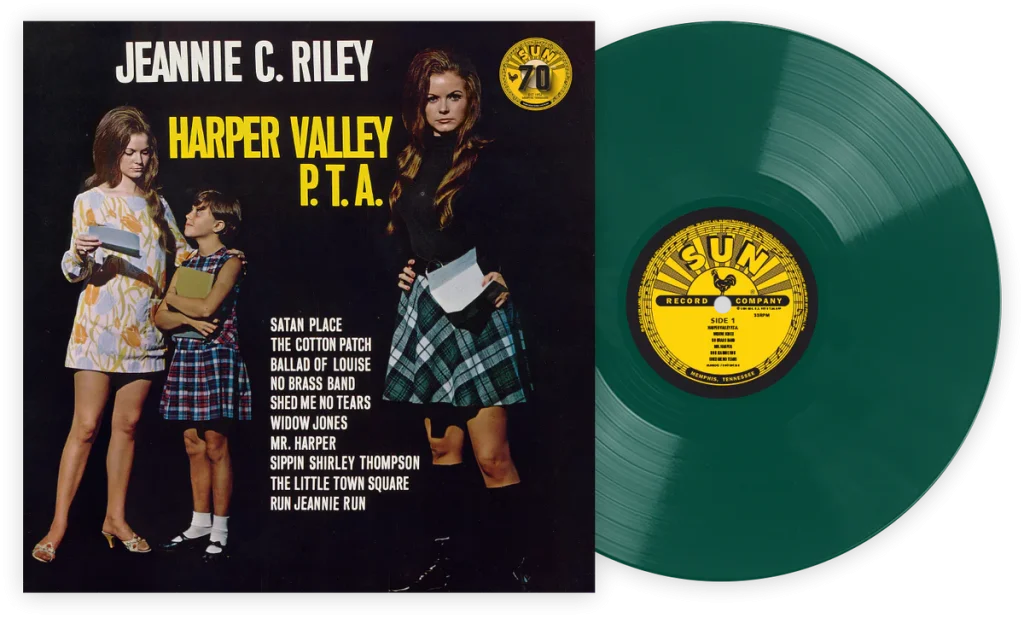“Harper Valley P.T.A.” by Jeannie C. Riley is a country song that captured the American public’s imagination with its sharp storytelling and social commentary. Released in August 1968, this track quickly climbed the charts, reaching number one on both the Billboard Hot 100 and the Hot Country Singles chart. Written by Tom T. Hall, the song is a quintessential example of country music’s narrative prowess, blending humor, satire, and a strong dose of social critique.

The song tells the story of a widowed mother named Mrs. Johnson who receives a letter from the local Parent-Teacher Association (P.T.A.) criticizing her behavior and lifestyle. The letter, filled with moral judgments, prompts Mrs. Johnson to confront the P.T.A. members in person. In a dramatic and empowering twist, she calls out the hypocrisy of the town’s so-called moral leaders, highlighting their own indiscretions and double standards.
The opening lines, “I wanna tell you all a story about a Harper Valley widowed wife,” immediately set the stage for a compelling narrative. Riley’s delivery is confident and engaging, drawing listeners into the story with her clear, expressive voice. The conversational tone of the lyrics creates a sense of immediacy and intimacy, making the listener feel as if they are right there in the small town of Harper Valley, witnessing the events unfold.
“Harper Valley P.T.A.” is a critique of the societal norms and moral pretensions of the late 1960s. By exposing the double standards of the P.T.A. members, the song resonates with anyone who has ever felt judged or marginalized by those in positions of authority. The line “This is just a little Peyton Place and you’re all Harper Valley hypocrites” is a direct jab at the self-righteousness often found in small-town dynamics.
Musically, the song is grounded in classic country with a catchy, upbeat tempo that contrasts with the serious nature of its lyrics. The instrumentation features twangy guitars, a steady rhythm section, and subtle backing vocals that enhance Riley’s storytelling without overshadowing it. The production is crisp and clean, allowing the narrative to take center stage.
Jeannie C. Riley’s performance on “Harper Valley P.T.A.” is both spirited and nuanced. Her vocal delivery captures the indignation and determination of Mrs. Johnson, imbuing the character with strength and authenticity. Riley’s ability to convey the song’s message with both wit and conviction is a key factor in its enduring appeal.
Upon its release, “Harper Valley P.T.A.” received widespread acclaim and commercial success. It became the first single by a female artist to top both the Billboard Hot 100 and the Hot Country Singles chart simultaneously, a testament to its broad appeal and the strength of its message. The song’s popularity also led to a 1978 film and a subsequent television series, both of which expanded on the story and characters introduced in the song.
For many older listeners, “Harper Valley P.T.A.” is a nostalgic reminder of a time when country music was not only entertaining but also a powerful medium for social commentary. The song’s themes of empowerment and standing up against hypocrisy resonate across generations, making it a timeless classic.
In conclusion, “Harper Valley P.T.A.” by Jeannie C. Riley is more than just a hit song; it is a bold statement against societal judgment and a celebration of individual courage. With its engaging narrative, catchy melody, and Riley’s charismatic performance, the song remains a significant piece of American musical history. Whether you’re revisiting it as a beloved memory or discovering it for the first time, “Harper Valley P.T.A.” offers a compelling and entertaining listening experience that underscores the enduring power of storytelling in country music.
Let’s sing along with the lyrics!
I wanna tell you all a story ’bout
A Harper Valley widowed wife
Who had a teenage daughter
Who attended Harper Valley Junior High
Well, her daughter came home one afternoon
And didn’t even stop to play
And she said, “mom, I got a note here from the Harper Valley PTA”
Well, the note said, “Mrs. Johnson
You’re wearin’ your dresses way too high
It’s reported you’ve been drinking
And a-running ’round with men and goin’ wild
And we don’t believe you oughta be a-bringin’ up
Your little girl this way”
And it was signed by the Secretary
Harper Valley PTA
Well, it happened that the PTA was gonna meet
That very afternoon
And they were sure surprised
When Mrs. Johnson wore her miniskirt into the room
And as she walked up to the blackboard
I can still recall the words she had to say
She said, “I’d like to address this meeting of the Harper Valley PTA
Well, there’s Bobby Taylor sittin’ there
And seven times he’s asked me for a date
And Mrs. Taylor sure seems to use a lotta ice
Whenever he’s away
And Mr. Baker can you tell us why
Your secretary had to leave this town?
And shouldn’t widow Jones be told to keep
Her window shades all pulled completely down
Well, Mr. Harper couldn’t be here
‘Cause he stayed too long at Kelly’s Bar again
And if you smell Shirley Thompson’s breath
You’ll find she’s had a little nip of gin
And then you have the nerve to tell me
You think that as the mother I’m not fit
Well, this is just a little Peyton Place
And you’re all Harper Valley hypocrites”
No, I wouldn’t put you on because it really did
It happened just this way
The day my mama socked it to the Harper Valley PTA
The day my mama socked it to the Harper Valley PTA